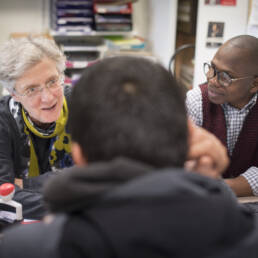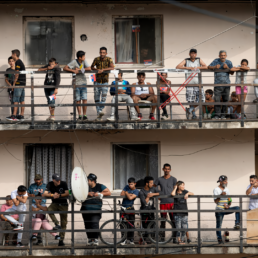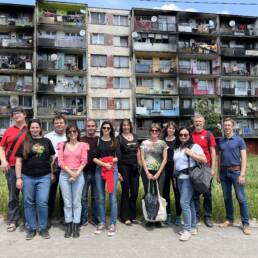Download the full report
The situations we face in the rural area are very complex due to the fact that the population is increasingly aging and is lacking the help of younger generations. Because of poverty and lack of jobs, the young people are choosing to go abroad to work in order to earn a somewhat decent income. More and more women are leaving their families, and not always with a labour contract or being sufficiently informed about the situation in the country to which they are going…. Neither mayors nor local authorities know how to respond to this situation, nor do they have solutions or receive help from the centre.
Social Worker in Caritas Iasi, Moldova region, Romania
People, especially those facing difficult life circumstances, are at the centre of Caritas’ concerns. And so it should also be for politicians and those who share a responsibility for the whole of society and its structures. Caritas Europa believes that structures should serve people, not the other way around. Structures that create or sustain social injustice, poverty and social exclusion have to be rethought and improved, or replaced by more just structures. In this case, more just structures would mean that people experiencing poverty are not shut out and abandoned, but rather, that a supportive social protection system is put in place to empower them and enable them to help themselves.
Such change processes can best be achieved when the people affected are actively involved in the decisions affecting them. By advocating for and with people in need and to transform society into a more just and inclusive civilisation, Caritas encourages people experiencing poverty to engage in these processes and to (re)discover that their voice does matter and that they do have the opportunity to impact their own situations, as well as those of their families’ and communities.
With such experiences as the basis for all Caritas advocacy work at local, regional, national, European and global levels, this publication aims to focus on solutions rather than on problems. National, diocesan and local Caritas across Europe do what they can to assist and empower people to escape from poverty, and will continue to do so until states take up their full responsibility for all residents.
I would like to personally thank those people experiencing poverty in Europe for sharing their testimonies and contributing to this publication. I would also like to thank the Caritas service providers, staff, and volunteers who are working to fill structural deficits and to provide a humane response to those in need. Without them, Caritas would not be able to bring real-life experiences to all political levels. In addition, I’d like to thank the members of the Caritas Europa Working Group on European Social Models, who provided guidance during the development of this publication and who have contributed to our visionary direction for Europe.
Generally, Caritas is called to denounce unjust structures: “The dignity of the human person and the common good rank higher than the comfort of those who refuse to renounce their privileges. When these values are threatened, a prophetic voice must be raised” to propose new solutions, because “inequality is the root of social ills” and “growth in justice requires more than economic growth”.
I hope that our Caritas analysis of the reality of poverty and social exclusion in Europe, as well as our innovative ways to address it, will inspire policy makers to explore, test and implement new ways to organise solidarity, in order to achieve greater social justice throughout Europe. I also hope this is perceived as a support to the proposed European Pillar of Social Rights as a crucial instrument for the EU to attain the Sustainable Development Goals. And finally, I hope it shall serve as inspiration for the advocacy of Caritas organisations, civil society organisations and for shaping policies proposed by policy makers in all European countries and beyond to achieve increasingly more, with the people, especially the most vulnerable, at the centre.
More information
Peter Verhaeghe
Senior Policy and Advocacy Officer
Tel: +32 (0)2 235 03 96
Mob: +32 (0)478 58 54 33
pverhaeghe@caritas.eu




